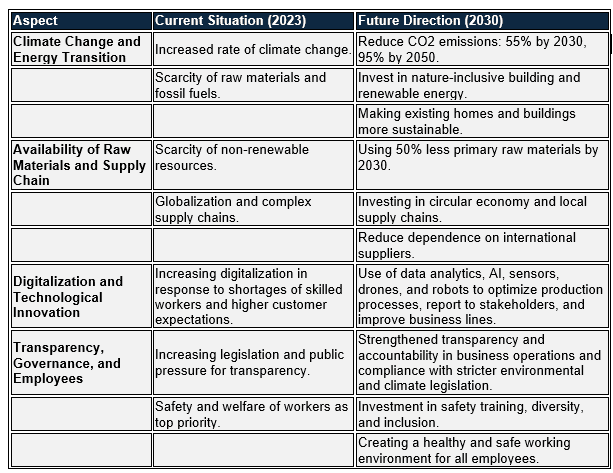As we approach 2030, the landscape of ESG practices is set to continue its rapid pace. Companies and investors in the European Union, and soon globally, will be mandated to adopt sustainable practices and report comprehensively on their ESG activities. Two of the most well-known reporting obligations driving this shift are the Corporate Sustainability Reporting Directive (CSRD) and the Sustainable Finance Disclosure Regulation (SFDR). To truly embrace sustainability, companies and investors must adopt a forward-thinking approach that goes beyond regulatory obligations. This article explores the role of investors in the future. By exploring the intersection of compliance, proactive ESG strategies, and long-term value creation, we aim to provide insights into what the role of businesses and investors will be by 2030 and beyond.
THIS ARTICLE IS WRITTEN BY MOURAD SEGHIR ([email protected]) AND HANS VAN LOENEN ([email protected]). MOURAD AND HANS ARE BOTH PART OF RSM NETHERLANDS BUSINESS CONSULTING SERVICES WITH A FOCUS ON SUSTAINABILITY & FINANCE.
The risk of short-term thinking
Without a clear vision, businesses are prone to falling into the trap of short-termism. This focus on immediate financial gains at the expense of long-term sustainability can have significant adverse effects. The lack of a coherent vision and strategy can result in several risks for both the company and its investors, as illustrated in the figure. These risks are not only individual in nature but also interrelated, creating a compounding effect that can further exacerbate challenges.
A lack of vision leads to short-term thinking, which undermines the basis for future innovations. When companies prioritize immediate profits, they often reduce investments in product development, research, and development. This shortsightedness limits technological advances and scientific discoveries, which are crucial for maintaining a competitive edge and fostering long-term growth.
For example, the economic impact of short-term thinking is profound. Large investors, such as pension funds and private equity firms, are often bound by sustainability legislation (such as CSRD, SFDR, and AMLD) and prefer companies with sustainable, long-term strategies. Companies that focus on short-term gains may struggle to attract and retain these vital sources of capital, as they fail to meet the growing demand for sustainable and responsible investment opportunities. These risks are interconnected and can amplify one another. For instance, a reduction in innovation and development due to short-term financial pressures can lead to inferior products, which in turn affects customer satisfaction and revenue. This decline in performance can make a company less attractive to long-term investors, further reducing capital for future investments. Additionally, poor employee morale can lead to poor productivity resulting in loss of turnover, increased hiring costs, and a loss of institutional knowledge, compounding the challenges faced by the company.
What direction are we headed towards; the ESG landscape in 2030?
By 2030, the focus is on achieving substantial reductions in CO2 emissions, significantly reducing the use of primary raw materials, and fostering local and circular supply chains. Technological innovations will play a critical role in optimizing business processes and improving stakeholder communication. Enhanced transparency and stronger governance frameworks will ensure companies remain accountable and compliant with evolving environmental and social standards. Investment in employee welfare, safety, diversity, and inclusion will create a more engaged and productive workforce.
To understand the future direction we are headed towards, particularly in the context of ESG, it is helpful to consider a rough sketch of the current situation and the envisioned state by 2030, as outlined below.

Forward-thinking; the role of the new investor
The new investor plays a crucial role in driving sustainable growth and long-term value creation. They support long-term strategies by prioritizing investments in innovation, sustainability, and strategic projects essential for future success. Active stewardship involves engaging regularly with companies to understand their strategies and ESG commitments, ensuring alignment with long-term objectives. Collaboration with stakeholders, including other investors, regulators, and the community, is key to driving systemic changes that promote sustainability. Enhancing corporate governance is another critical responsibility, encouraging companies to adopt robust governance frameworks that ensure ethical behavior and effective risk management.
The impact of the new investor includes increased innovation through support for long-term investments, enhanced risk management by integrating ESG factors, and more stable and sustainable financial returns from a focus on long-term strategies. They also drive positive social and environmental changes by prioritizing ESG considerations and improving corporate behaviour through active engagement, leading to better accountability and transparency. In conclusion, by focusing on long-term value creation and integrating ESG factors, the new investor can drive meaningful change, supporting a sustainable and resilient economy while mitigating risks and unlocking opportunities for innovation and growth.
RSM is a thought leader in the field of Sustainable Finance consulting. We offer frequent insights through training and sharing of thought leadership based on a detailed knowledge of industry developments and practical applications in working with our customers. If you want to know more, please contact one of our consultants.

